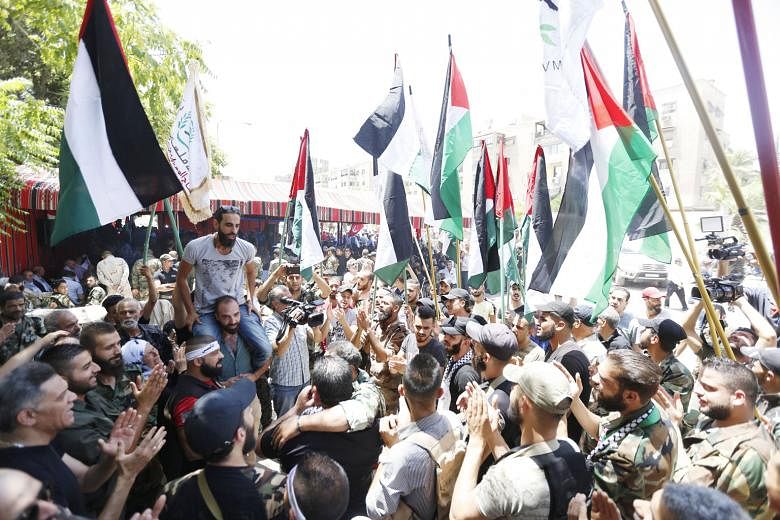MANAMA • The Trump administration prepared to launch its US$50 billion (S$68 billion) economic formula for Israeli-Palestinian peace in Bahrain yesterday, but the Palestinian leadership reiterated its disdain for the plan and Saudi Arabia, envisaged as one of its main bank rollers, indicated its reservations.
The two-day international meeting, led by President Donald Trump's son-in-law and senior adviser Jared Kushner, has been billed as the first part of Washington's broader political blueprint to resolve the long-running Israeli-Palestinian conflict.
Listing a slew of economic projects to develop roads, border crossings, power generation and tourism, the framework sets an optimistic goal of creating one million Palestinian jobs.
However, the political details of the plan, which has been almost two years in the making, remain a secret. And neither the Israeli nor Palestinian governments will attend the curtain-raising event in Bahrain's capital, Manama.
Palestinian President Mahmoud Abbas, whose Palestinian Authority exercises limited self-rule in the Israeli-occupied West Bank, was scathing about the plan's prospects of success.
"Money is important. The economy is important. But politics is more important. The political solution is more important."
In Gaza and the West Bank, Palestinians protested against the plan and burned portraits of Mr Trump.
Washington will be hoping that attendees in Manama such as wealthy Gulf Arab states will show a concrete interest in the plan, which expects donor nations and investors to contribute US$50 billion to Palestinian territories, Jordan, Egypt and Lebanon.
Saudi Arabia - a close US ally which shares a common foe with Israel in Iran - yesterday voiced support for "international efforts aimed at improving prosperity, investment and economic growth in the region".
But Riyadh reiterated that any peace deal should be based on the Saudi-led Arab peace initiative that has been the Arab consensus on the necessary elements for a deal since 2002.
That calls for a Palestinian state drawn along borders which predate Israel's capture of territory in the 1967 Middle East war, as well as a capital in East Jerusalem and refugees' right of return - points rejected by Israel.
Mr Kushner said on Monday that the plan would not adhere to the Arab initiative.
"It will be somewhere between the Arab Peace Initiative and between the Israeli position," Mr Kushner told Al Jazeera TV in an interview to air yesterday.
Chief Palestinian negotiator Saeb Erekat said Mr Kushner is "committed to the initiatives of Israel's colonial settlement councils".
Mr John Bolton, Mr Trump's national security adviser, said it was a "mistake" for the Palestinians to boycott the conference.
"The prospects for Palestinians, for Israelis, for everybody in the region, if we could find an acceptable agreement between Israel and the Palestinians, are incredibly bright, and rather than relitigate decades of disputes, think about the future and negotiate on that basis," Mr Bolton said in Jerusalem, where he met Israeli Prime Minister Benjamin Netanyahu and visited the occupied Jordan Valley.
Mr Netanyahu, a close Trump ally who is facing an election, said on Sunday that Israel was open to the Kushner plan.
"We'll hear the American proposition, hear it fairly and with openness," he said.
Expectations for success are, however, low. The Trump team concedes the economic plan - billed as "Peace to Prosperity" - will be implemented only if a political solution to one of the world's most intractable conflicts is reached.
The highest-ranking Arab official at the Manama conference appears to be Saudi Arabia's Finance Minister Mohammed Al-Jadaan. Most European allies of the United States, uneasy about Mr Trump's direction, are staying away from the Bahrain event.
REUTERS, AGENCE FRANCE-PRESSE

